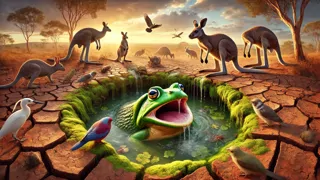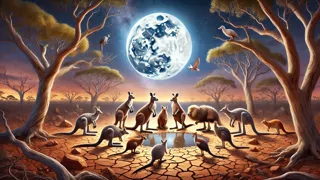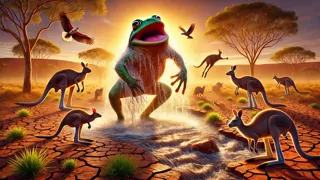Introduction
In the vast reaches of the Australian Outback, where red dust drifts like whispered memories across ochre plains, there lay once a land brimming with hidden waterholes, secret springs, and winding creeks that wound through rocky gorges like shimmering ribbons of silver. This was a world alive with the quiet ripple of turtles sliding beneath lily pads, the solemn footprints of kangaroos converging at hidden billabongs, and the mirrored skies reflecting the great celestial tapestry above. It was here that Tiddalik the frog awoke from his ancient slumber, his emerald skin glistening with dew, his heart filled with a hunger unlike any other hunger. Legend says the Dreaming spirits breathed into him a desire so powerful that it dwarfed the need for flesh or shelter: he craved the taste of every drop of water. With one mighty croak he plunged his head into the calm water of a rock pool and began to drink. In moments, the once-luscious oasis that cradled swaying reeds and golden wagtails lay bare and cracked. Tiddalik rose, throat swollen and triumphant, oblivious to the hush his gluttony cast over the land. As the sun climbed its arc over distant ranges, frogs, wallabies, emus, and all creatures great and small discovered every waterhole had vanished, swallowed by the giant amphibian’s unquenchable thirst. Panic spread like wildfire through the red earth. Without water, no kangaroo could bound, no thorny devil could melt the heat in its veins, and even the river gums bowed their branches in silent lament. From parched wombat warrens to empty abodes beneath ghost gums, life itself teetered on the brink. Now the animals faced a test: how to coax water from Tiddalik’s bulging belly and save their world from desiccation. Their only hope lay in cunning, unity, and a song woven from laughter and light – a plan that would awaken the Dreaming itself and remind all that balance in Nature must never be broken.
The Awakening of Tiddalik
In the earliest days of the Dreamtime, when the world was young and the land still hummed with the footprints of spirits, there existed a peaceful landscape of hidden waterholes. Fresh streams trickled through stones smooth as river pearls, and ancestral trees draped their limbs with moss and lichen. Amphibians like Tiddalik were small creatures of little note, hopping among reeds and mud banks. Yet beneath a canopy of ghost gums, a single egg of unusual promise lay nestled in soft, damp earth. When Tiddalik hatched, his skin shimmered with hues of jade and gold, and the Dreaming breathed into his veins a thirst unlike any other—a hunger not for prey, but for water itself.

As he grew, Tiddalik’s appetite for water became legendary. Day after day, he would slide into bubbling springs, his throat expanding with each great gulp. Rainfall that once collected in hidden basins vanished in minutes, leaving ferns drooping and lillies withering. The frogs in nearby billabongs watched with astonishment; wallabies halted mid-bound at the sight of empty pools; kangaroos touched their nostrils to the ground, smelling for moisture that no longer existed. But Tiddalik remained undisturbed, reveling in each swallow, convinced he alone was the rightful keeper of the land’s moisture.
Through wind-whispered canyons and across dusty plains, word of Tiddalik’s gluttony traveled on the wings of cockatoos and the calls of kookaburras. Even the red-tailed black cockatoo, with its bright crest aflutter, scolded him in a harsh, rattling voice. “Tiddalik,” it cried, “you bring suffering where you go! Return the water you have stolen, or the land will be no more!” But the frog only croaked in reply, lifting his crown into the evening sky as if challenging the very stars to refill the hollows he had emptied.
Night fell with a heavy stillness, and the animals gathered under the ghostly light of a full moon. Dingoes padded quietly, emus stood tall, and bandicoots crept from warrens. There, at a council under twisted ghost gums, they pledged to find a way to restore the streams and pools and to coax the water from Tiddalik’s greedy throat. For without their shared ingenuity and courage, the Outback would wither into a husk of dust and despair, and the Dreamtime itself would lose its song in the silence of thirst.
A Land Left Dry
With Tiddalik’s gluttonous thirst satisfied, the land groaned under the weight of his stolen waters. Creeks that once danced over stones lay silent and parched. River gums drooped in mournful arcs, their bark cracking like ancient parchment. Kangaroos kicked at dust hills where their footprints once led to shady pools. Emus circled empty basins, searching in vain for the life-giving liquid they once drank. Even the wind seemed to sigh in sadness, stirring only faint dust motes as it crossed the bleak horizon.

As dawn painted the Outback in hues of rose and copper, the animals convened in a great hollow beneath a towering red gum. The kookaburra, its bright crest reflecting the sunrise, opened the council and recalled the days when water glistened in every hollow. “When Tiddalik drank,” it cawed, “he did not know the grief he caused. Now all of us suffer.” The dingo, lean and silent, nodded sharply. “We must use our cleverness,” it growled. “Alone, each of us is small. Together, we can become many voices, a chorus that might coax Tiddalik to laughter—and laughter might force the water free.”
Across the gathering, even shy creatures stirred with hope. The echidna rolled half out of its spines and spoke in a low, rumbling voice: “I know a song of mirth, but I cannot perform it alone. Someone must be the first to dance.” A wallaby hopped forward, ears pricked. “I will dance for life,” she declared. “For every creature that thirsts, I will leap and bound until my heart glows with the joy of water regained.” From the swaying branches above, possums chirped their assent. Together, they wove a plan of sound and movement: one animal would dance, another would sing, and a chorus of voices would ripple through the Outback, until Tiddalik’s great belly quivered with laughter.
As the moon climbed high in the cobalt sky, the preparations began. Crickets tuned their nightly symphony, emus practiced their stately strut, and frogs—though amist at Tiddalik’s betrayal—huddled to learn the ancient dance step. The land itself seemed to listen, as if the red earth remembered the gentle rhythm of rain and awaited its return. Under the canopy of stars, the animals, bound by a shared purpose, took their positions. Their hearts beat with equal measures of fear and hope, for they knew this plan carried their only chance to coax the water back from the frog’s swollen throat.
The next dawn would be the moment of truth. Would Tiddalik yield to the joy of the song, or would he stand proud and silent, the world around him forever lost to drought?
The Clever Plan Unfolds
When the first rays of dawn spilled over the horizon, the Outback gleamed in shades of rust and gold. The animals emerged from their hiding places in a single line, each poised to play its part in the grand design. The crickets began with a trembling trill, weaving a gentle prelude that rippled across the cracked soil. Slowly, a lone wallaby stepped into the clearing, raising her paws in a graceful arc. With each hop she sprinkled the dust upward, creating a fleeting dust cloud that glowed like an ephemeral sunrise.

Behind her, emus strutted in stately cadence, their long necks curving in measured bows. Possums clapped their paws in time to the rhythm, and kookaburras soared above, cawing a melody of hope. The marsupials moved as if guided by an invisible conductor, each leap and chirp building into a crescendo that shook the silent plains. Even the wind stirred in wonder, carrying the tune across dry creek beds and into the rocky gorges where Tiddalik lay coiled like a great green boulder.
At first the frog remained still, nostrils flaring as he absorbed the curious spectacle. His throat throbbed from the weight of stolen water, and his round eyes blinked at the dancers. But as the song soared to its peak, a slow rumble began in his belly, deep as thunder rolling through distant hills. The animals watched with bated breath when Tiddalik’s great mouth quivered at the corners. Then, with a sound like a thousand raindrops bursting, laughter erupted from him—an eruption of joy so pure it trembled in the very air.
As Tiddalik laughed, the water surged forth in a sudden flood. First, small rivulets trickled from his throat, pooling at his feet. Then, like unlocking a dam, torrents gushed, filling dried river beds and soaking the thirsty earth. The song carried the water along, nourishing every root and blade of grass it touched. Ferns unfurled, lilies bloomed, and the river gums straightened their weary limbs. Creatures spilled out to lick the fresh supply—frogs resumed their chorus by babbling springs, kangaroos bounded with renewed strength, and emus dipped their beaks in the clear water.
When the laughter finally faded and the land sang again with the voice of streams, Tiddalik blinked in astonishment. The animals approached him with gentle respect. “We took back what sustains us, not to punish you,” the kookaburra cawed softly. “May you remember that water is for all creatures, and that joy shared can bring back life.” Tiddalik bowed his head in humility, his great throat deflating as he admitted his mistake. From that day on, every time he laughed, a drop of water blessed the land—a reminder that balance in Nature is born from unity and shared delight.
Conclusion
As the sun dipped behind distant ranges, painting the sky in streaks of burnt orange and lavender, the land hummed once more with life. Tiddalik the frog reclined by a sparkling spring, his heart light and his throat at ease, knowing water flowed freely for all. The animals—kangaroos, emus, possums, and more—drank, danced, and rejoiced beneath the ancient ghost gums, forever bound by the memory of their shared efforts. In the Dreamtime that wove all things together, this tale became a song passed from parent to joey, from elder to child, a reminder that greed left the heart parched and that only through unity and laughter could true abundance return. Whenever the Outback crackles in heat and creatures search the dusty earth for relief, they recall the council under the full moon and the dance that coaxed Tiddalik’s laughter. And when a solitary frog croaks by a hidden billabong, the wind carries his melody as a blessing: water is life, and joy shared is the greatest gift of all.
















